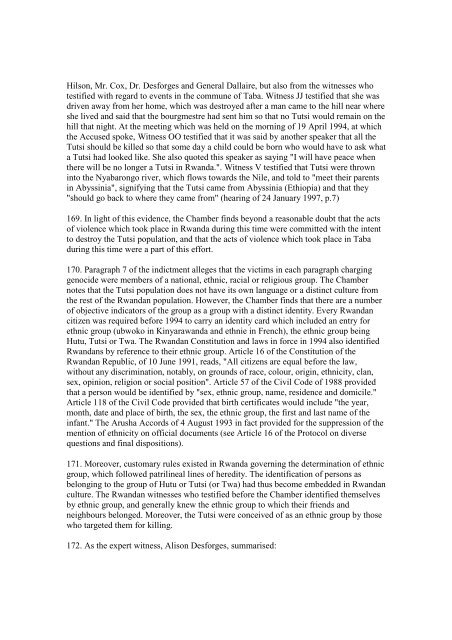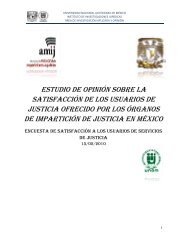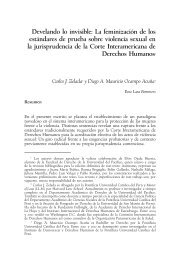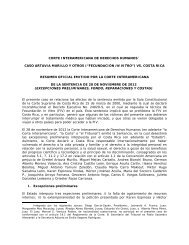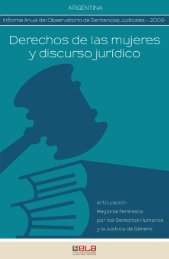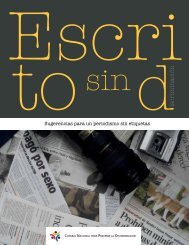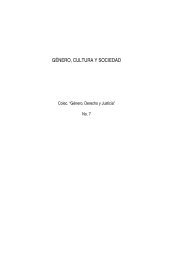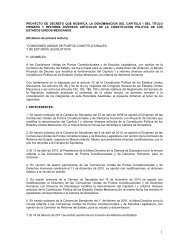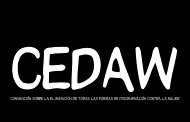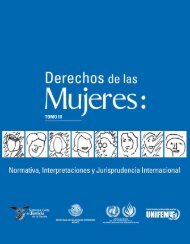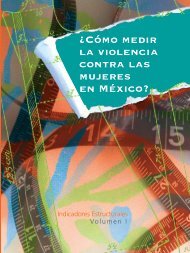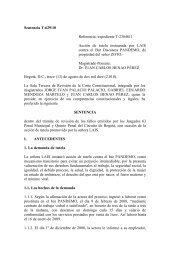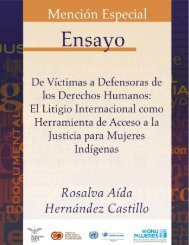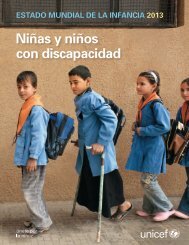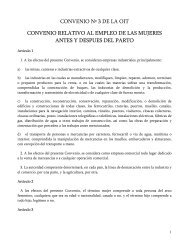Hilson, Mr. Cox, Dr. Des<strong>for</strong>ges and General Dallaire, but also from the witnesses whotestified with regard to events in the commune of Taba. Witness JJ testified that she wasdriven away from her home, which was destroyed after a man came to the hill near whereshe lived and said that the bourgmestre had sent him so that no Tutsi would remain on thehill that night. At the meeting which was held on the morning of 19 April 1994, at whichthe Accused spoke, Witness OO testified that it was said by another speaker that all theTutsi should be killed so that some day a child could be born who would have to ask whata Tutsi had looked like. She also quoted this speaker as saying "I will have peace whenthere will be no longer a Tutsi in <strong>Rwanda</strong>.". Witness V testified that Tutsi were throwninto the Nyabarongo river, which flows towards the Nile, and told to "meet their parentsin Abyssinia", signifying that the Tutsi came from Abyssinia (Ethiopia) and that they"should go back to where they came from" (hearing of 24 January 1997, p.7)169. In light of this evidence, the Chamber finds beyond a reasonable doubt that the actsof violence which took place in <strong>Rwanda</strong> during this time were committed with the intentto destroy the Tutsi population, and that the acts of violence which took place in Tabaduring this time were a part of this ef<strong>for</strong>t.170. Paragraph 7 of the indictment alleges that the victims in each paragraph charginggenocide were members of a national, ethnic, racial or religious group. The Chambernotes that the Tutsi population does not have its own language or a distinct culture fromthe rest of the <strong>Rwanda</strong>n population. However, the Chamber finds that there are a numberof objective indicators of the group as a group with a distinct identity. Every <strong>Rwanda</strong>ncitizen was required be<strong>for</strong>e 1994 to carry an identity card which included an entry <strong>for</strong>ethnic group (ubwoko in Kinyarawanda and ethnie in French), the ethnic group beingHutu, Tutsi or Twa. The <strong>Rwanda</strong>n Constitution and laws in <strong>for</strong>ce in 1994 also identified<strong>Rwanda</strong>ns by reference to their ethnic group. Article 16 of the Constitution of the<strong>Rwanda</strong>n Republic, of 10 June 1991, reads, "All citizens are equal be<strong>for</strong>e the law,without any discrimination, notably, on grounds of race, colour, origin, ethnicity, clan,sex, opinion, religion or social position". Article 57 of the Civil Code of 1988 providedthat a person would be identified by "sex, ethnic group, name, residence and domicile."Article 118 of the Civil Code provided that birth certificates would include "the year,month, date and place of birth, the sex, the ethnic group, the first and last name of theinfant." The Arusha Accords of 4 August 1993 in fact provided <strong>for</strong> the suppression of themention of ethnicity on official documents (see Article 16 of the Protocol on diversequestions and final dispositions).171. Moreover, customary rules existed in <strong>Rwanda</strong> governing the determination of ethnicgroup, which followed patrilineal lines of heredity. The identification of persons asbelonging to the group of Hutu or Tutsi (or Twa) had thus become embedded in <strong>Rwanda</strong>nculture. The <strong>Rwanda</strong>n witnesses who testified be<strong>for</strong>e the Chamber identified themselvesby ethnic group, and generally knew the ethnic group to which their friends andneighbours belonged. Moreover, the Tutsi were conceived of as an ethnic group by thosewho targeted them <strong>for</strong> killing.172. As the expert witness, Alison Des<strong>for</strong>ges, summarised:
"The primary criterion <strong>for</strong> [defining] an ethnic group is the sense of belonging to thatethnic group. It is a sense which can shift over time. In other words, the group, thedefinition of the group to which one feels allied may change over time. But, if you fixany given moment in time, and you say, how does this population divide itself, then youwill see which ethnic groups are in existence in the minds of the participants at that time.The <strong>Rwanda</strong>ns currently, and <strong>for</strong> the last generation at least, have defined themselves interms of these three ethnic groups. In addition reality is an interplay between the actualconditions and peoples' subjective perception of those conditions. In <strong>Rwanda</strong>, the realitywas shaped by the colonial experience which imposed a categorisation which wasprobably more fixed, and not completely appropriate to the scene. But, the Belgians didimpose this classification in the early 1930's when they required the population to beregistered according to ethnic group. The categorisation imposed at that time is whatpeople of the current generation have grown up with. They have always thought in termsof these categories, even if they did not, in their daily lives have to take cognizance ofthat. This practice was continued after independence by the First Republic and theSecond Republic in <strong>Rwanda</strong> to such an extent that this division into three ethnic groupsbecame an absolute reality".173. Paragraph 8 of the indictment alleges that the acts set <strong>for</strong>th in each paragraph of theindictment charging crimes against humanity, i.e. paragraphs 12-24, "were committed aspart of a widespread or systematic attack against a civilian population on national,political, ethnic or racial grounds". As set <strong>for</strong>th in the evidence, the scale of the attackwas extraordinary. Defence counsel called the events which took place in <strong>Rwanda</strong> in1994 "the greatest human tragedy" at the end of this century. Around the country, amassive number of killings took place within a very short time frame. Tutsi were clearlythe target of the attack - at roadblocks, in shelters, and in their own homes. Hutusympathetic to or supportive of Tutsi were also massacred. That the attack was systematicis evidenced by the unusually large shipments of machetes into the country shortly be<strong>for</strong>eit occurred. It is also evidenced by the structured manner in which the attack took place.Teachers and intellectuals were targeted first, in Taba as well as the rest of the country.Through the media and other propaganda, Hutu were encouraged systematically to attackTutsi. For these reasons, the Chamber finds beyond a reasonable doubt that a widespreadand systematic attack began in April 1994 in <strong>Rwanda</strong>, targeting the civilian Tutsipopulation and that the acts referred to in paragraphs 12-24 of the indictment were actswhich <strong>for</strong>med part of this widespread and systematic attack.174. Paragraph 9 of the indictment states, "At all times relevant to this indictment, a stateof internal armed conflict existed in <strong>Rwanda</strong>". The Chamber notes the testimony ofGeneral Dallaire, a witness called by the Defence, that the FAR was and the RPF were"two armies" engaged in hostilities, that the RPF had soldiers systematically deployedunder a command structure headed by Paul Kagame, and that FAR and RPF <strong>for</strong>cesoccupied different sides of a clearly demarcated demilitarised zone. Based on theevidence presented, the Chamber finds beyond a reasonable doubt that armed conflictexisted in <strong>Rwanda</strong> during the events alleged in the indictment, and that the RPF was anorganised armed group, under responsible command, which exercised control overterritory in <strong>Rwanda</strong> and was able to carry out sustained and concerted military operations.
- Page 2 and 3: 1.2. The Indictment1.3. Jurisdictio
- Page 4 and 5: eports2 which indicated that acts o
- Page 6 and 7: 3. Jean Paul AKAYESU, born in 1953
- Page 8 and 9: 16. Jean Paul AKAYESU, on or about
- Page 10 and 11: Counts 7-8(Crimes Against Humanity)
- Page 12 and 13: c) Deliberately inflicting on the g
- Page 14 and 15: 1.4. The Trial1.4.1. Procedural Bac
- Page 16 and 17: y the opening statement for the Def
- Page 18 and 19: y the Tribunal for crimes related t
- Page 20 and 21: 38. Regarding the Gishyeshye meetin
- Page 22 and 23: witness was lying because he or she
- Page 24 and 25: in the commune. His de facto author
- Page 26 and 27: 70. Apart from asking the prefect t
- Page 28 and 29: 84. According to the testimony of D
- Page 30: Scores of political leaders were im
- Page 33 and 34: his listeners to avoid the error of
- Page 35 and 36: 111. The killing of Tutsi which hen
- Page 37 and 38: killed on the grounds that the foet
- Page 39 and 40: 128. In conclusion, it should be st
- Page 41 and 42: Witness statements137. During the t
- Page 43 and 44: protection of witnesses issued by t
- Page 45 and 46: covered anyone who had anti-Tutsi t
- Page 47 and 48: Tutsi and the Tutsi were accused of
- Page 49: as "two armies", "two belligerents"
- Page 53 and 54: 180. Many witnesses testified regar
- Page 55 and 56: stated in that Decision, it did not
- Page 57 and 58: deeds. For these reasons, the Chamb
- Page 59 and 60: Concerning the allegation that at l
- Page 61 and 62: turned over alive to Akayesu, and t
- Page 63 and 64: younger brothers. He stated that he
- Page 65 and 66: 237. Karangwa testified under cross
- Page 67 and 68: three brothers lie on their stomach
- Page 69 and 70: known as Usuri (phonetic spelling)
- Page 71 and 72: Karangwa's explanation for the inco
- Page 73 and 74: Count 3, Crimes against Humanity (e
- Page 75 and 76: those killed were professors from R
- Page 77 and 78: 290. Witness DCC for the Defence, d
- Page 79 and 80: children, and old people. The Chamb
- Page 81 and 82: further that he had not heard of Ak
- Page 83 and 84: to fetch the one who remains', a pr
- Page 85 and 86: sector councillors called on the cr
- Page 87 and 88: According to witness A, the bourgme
- Page 89 and 90: present took it to mean that the Tu
- Page 91 and 92: 355. The Accused himself confirmed
- Page 93 and 94: 364. Paragraph 15 of the Indictment
- Page 95 and 96: The witness said a certain Françoi
- Page 97 and 98: has not been proved beyond reasonab
- Page 99 and 100: who had come to his house. He said
- Page 101 and 102:
Interahamwe at the entrance, carryi
- Page 103 and 104:
ack to the bureau communal and on t
- Page 105 and 106:
Victim Y (Witness N), a [68] year o
- Page 107 and 108:
which were at times committed by mo
- Page 109 and 110:
communal into a forest in the area
- Page 111 and 112:
clubbing a young teacher who had be
- Page 113 and 114:
434. Two days after arriving at the
- Page 115 and 116:
he went into hiding during the mass
- Page 117 and 118:
ureau communal, but he insisted tha
- Page 119 and 120:
taken away from the bureau communal
- Page 121 and 122:
The Accused himself testified that
- Page 123 and 124:
464. In that case, when the matter
- Page 125 and 126:
"A person who planned, instigated,
- Page 127 and 128:
involve facilitating the commission
- Page 129 and 130:
493. In accordance with the said pr
- Page 131 and 132:
Deliberately inflicting on the grou
- Page 133 and 134:
y a psychological relationship betw
- Page 135 and 136:
Chamber notes that, as stated above
- Page 137 and 138:
• complicity by procuring means,
- Page 139 and 140:
547. Consequently, where a person i
- Page 141 and 142:
underscoring their commitment to se
- Page 143 and 144:
character134. In fact, the concept
- Page 145 and 146:
575. The definition of crimes again
- Page 147 and 148:
grounds mentioned in Article 3 of t
- Page 149 and 150:
accepted definition of this term in
- Page 151 and 152:
adopted primarily to protect the vi
- Page 153 and 154:
610. Whilst the Chamber is very muc
- Page 155 and 156:
description, namely, what constitut
- Page 157 and 158:
forces to plan and carry out concer
- Page 159 and 160:
635. There is no clear provision on
- Page 161 and 162:
7.2. Count 5 - Crimes against human
- Page 163 and 164:
663. The definition of crimes again
- Page 165 and 166:
677. The Tribunal notes that eviden
- Page 167 and 168:
685. In the light of its factual fi
- Page 169 and 170:
692. The Tribunal finds, under Arti
- Page 171 and 172:
determine, as far as each proven fa
- Page 173 and 174:
the Tutsi in general. Akayesu who h
- Page 175 and 176:
722. As regards the allegations in
- Page 177 and 178:
732. The rape of Tutsi women was sy
- Page 179 and 180:
Chamber finds beyond a reasonable d
- Page 181 and 182:
Footnote 11. Decision: Order for Co
- Page 183 and 184:
Footnote 41. Article 104 of the Loi
- Page 185 and 186:
Footnote 68. Dictionnaire Rwandais-
- Page 187 and 188:
Footnote 103. "Principles of Intern
- Page 189 and 190:
Footnote 134. Secretary General's R
- Page 191:
Footnote 171. See General Legal Fin


